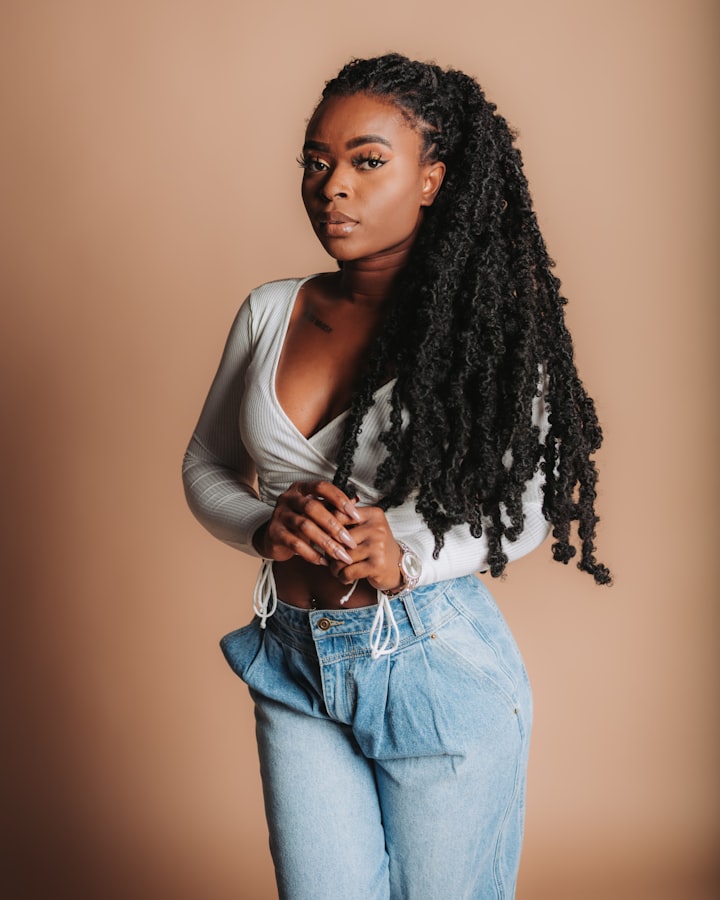
This article will cover the fundamentals of maintaining natural Black hair. We'll discuss historical background and myth-busting, deconstruct some important components of a hair care regimen, and get professional recommendations.
Get your head straight first.
I believe it's crucial to start with preparing your head before you begin preparing your strands. Anybody who possesses Black hair or comes into touch with Black hair should be aware of the unique obstacles it faces, both in terms of maintenance and historical context.
The erasure of Black People' history has included their hair since their ancestors were first transported to this nation. Black people were punished by having their heads shaved by slave traffickers, free Black women had to hide their hair, and even today, a lot of Black adults and kids face consequences for having their natural hair out at work or school.
It might be intimidating to really love oneself since Black people have been socialized to feel that it is unsafe to be authentic in many contexts. To combat this, we need to promote diversity and educate people.
A. Considering the variations in Black hair with caution
Knowing the true variations between Black and non-Black hair and how their demands vary is crucial. We spoke to Abolore Adekoya, a trichologist (essentially an authority on healthy hair and scalp), Board Certified Registered Nurse, and proprietor of The Trichology Nurse Suite in Chesapeake, Virginia, to get a better perspective.
"Black hair or textured hair has different demands than other hair [types] since it may sometimes lack moisture, which causes the hair to split or become brittle," the expert notes. The natural sebum we create on our scalps does not completely travel down to the ends of our hair strands as it does with hair types that are straighter because of the structure and coiling of our hair.
"This natural oil is supposed to coat and shield the hair, but it gets stuck in the hair's ridges and does not slide down the hair strands. In order to avoid breakage, we thus need to adequately hydrate our hair.
As you may have guessed, Black hair requires almost the exact opposite care from many other hair kinds. Black folks use oils and leave-in conditioners instead of the frequent washing, sparing conditioning, and liberal application of dry shampoo that many non-Black people lament. That is to say, there are valid reasons for the differences in our habits and goods.
suggestions for parents
If you're a parent whose kid is Black but whose race isn't Black, you could have been frustrated when you attempted to use your own hair care products on them but were unable. It is typical. Yet it counts how you react.
Be aware of your language while discussing your child's hair, just as you should with every other part of parenting. Don't dismiss the variations because A: Children are intelligent. B: During their lifetimes, many people will criticize them for their differences. Instead, you should value each person's unique qualities and appreciate their uniqueness.
For instance, shrinking, or the change in hair length from wet to dry, occurs among Black people and those with natural hair textures comparable to their own. In stark contrast to what occurs to hair that is straighter and thinner, this phenomenon occurs. Usually, the risk of shrinking increases with the degree of coiling in the hair.
Many Black people, especially women, deal with how shrinking alters style or the way that length of hair is seen in general. Yet recognizing the adaptability of magic could be a more constructive strategy. It's fantastic to have hair that can grow to whatever length you want it to without ever needing to use a pair of scissors, whether that's shoulder-length today or a 2-inch long afro tomorrow.
Discover the enchantment in the distinctions between your hair and that of your kid, and together, come to embrace it.
Advice for those making the switch
Congratulations and get ready if you're a Black person trying out natural hair care for the first time! Making the switch to natural hair might reveal worries and prejudices in many of us that we may not have been aware of.
Giving yourself grace, being kind to yourself, and controlling your self-talk as you strive toward healthy hair and self-acceptance should all be important parts of this process.
B. Maintaining Black hair
It's time to experiment with your hair now! Here are a few suggestions that might make your life simpler before you enter the shower.
Prior to washing
Recall Adekoya's statement that fragile hair eventually breaks? By constantly detangling the hair while it's wet, you may entirely avoid that danger. The moisture will lengthen and swell the hair, untangling any knots. If you prefer to detangle in the shower, acquire a shower comb and make sure to use a wide-toothed comb to achieve this.
Lastly, prepray your hair if required. Many naturals "pre-poo" (shampoo, not the other thing) their hair to give it a little more attention before using a shampoo that could be stripping. Before washing, I like to add conditioner, detangle with it, then twist my hair into big twists. In this manner, I can cut down on shower time, use the conditioner to help me detangle my hair, increase the moisture in my hair before washing, and prevent my hair from tangling again in the shower (as it is prone to do).
So, before washing your hair, take a time to determine what it needs.
Although while Black people's hair doesn't accumulate oil the same way other hair types do, washing is still a crucial step, according to Adekoya.
Going back to the fundamentals and making sure your scalp and hair are clean is the most crucial component of a good hair care regimen, according to Adekoya. "For [Black] folks, product accumulation is a major issue while styling our hair. We often neglect to adequately cleanse in order to get rid of all the gels, sprays, pomades, and other products we use. If you don't see a hairdresser often, the easiest thing you can do is having nice professional products on hand to wash your hair at home.
Hair Styling Personal preferences in hair style might differ greatly from person to person, but generally speaking, the maxim "put it away, keep it happy" holds true.
Leaning on protective techniques like braids and twists is essential for maintaining healthy hair since dry air and excessive manipulation may harm sensitive strands. Adekoya continues, "A lot of new naturals prefer to perform a "wash n' go" approach when it comes to hair styling for healthy hair. (A style that emphasizes the use of products to accentuate curls without the use of twisting, braiding, or other manipulative techniques.)
This style may not always be the best choice depending on your hair structure or curl pattern. For instance, the tightest curl pattern is type 4C, which describes my hair. My hair tends to tangle easily and I often get little knots at the ends, sometimes known as "fairy knots" or single-strand knots, thus wash and go styles are a HUGE NO for me.
We may decide against using Wash N' Go styles since many 4C curlies have this problem. Due to the fact that many individuals strain the side of their hair to fit into a tight puff or high bun, high puffs may also cause damage to the hairlines or edges. As a result, traction alopecia, a kind of hair loss, may result.
Try to strike a balance between overprotection and overmanipulation whenever you style your hair.
D. Preserving the health of black hair
Put it away and keep it content also works at night! One of the finest hair care recommendations, according to Adekoya, is to sleep in satin bonnets or caps.
The greatest preparation for your hair the following day is to gently remoisturize it (without sacrificing your style) and wrap it up. And making your mornings simpler by securing it with a silk, satin, or hat maintains your hair healthy.
Almost all Black people, whether natural or not, have been urged to wrap their hair at night. When I was tired at night, messing with my hair was the last thing I wanted to do, so I used to struggle against it. But more lately, as I've progressed with my natural hair journey, I've learned to cherish the solitudes of the evening. For me, these very much encapsulate the whole adventure. I'm taking good care of myself, my hair, and getting ready for some magic in the morning.
To sum up
The enchantment of black hair is genuine. Its adaptability and textures provide a wealth of opportunities for exploration and self-discovery.






Comments
There are no comments for this story
Be the first to respond and start the conversation.